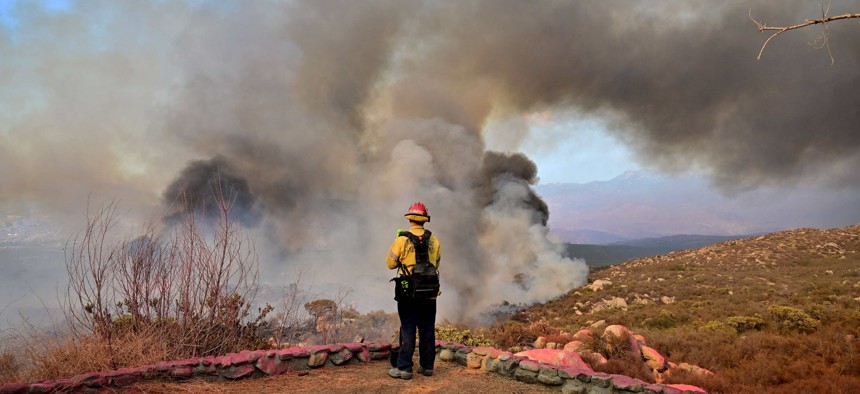Wildfires are Burning an Ever-larger Hole in State Budgets

A firefighter working under extreme heat conditions watches as smoke erupts from a hillside fire in Hemet, California in September. Frederic J. Brown/AFP via Getty Images

Connecting state and local government leaders
New research looks at the fiscal pressure states are under dealing with the blazes and makes suggestions for funding improvements.
The growing cost of wildfires is putting bigger strains on state budgets, often forcing public officials to scramble to find money for firefighting efforts, researchers at a think tank warned Wednesday.
The words of caution come from a new report from The Pew Charitable Trusts that describes the increased demands on fire-related programs. The report also highlights the complex budgetary maneuvers that state officials must take to share costs of fire prevention and fire suppression with local and federal agencies.
“The growing incidence, size and spending required to deal with wildfires pose a major challenge across the United States,” the researchers wrote. “The nation’s complex, intergovernmental approach to wildfire management means that efforts to manage growing spending—not to mention impacts on the environment and human lives—must be well coordinated and based on the best possible information.”
Climate change and growing development in previously remote areas are contributing to a surge in costs for wildfires, said Colin Foard, the lead author of the Pew report. He said it’s not yet possible to track how much states collectively spend on wildfire mitigation, suppression and recovery, because of limits with state data.
But there are many indications the tab is growing quickly.
For example, the researchers noted, the state of Washington spent an average of $24 million in state funds on wildfire suppression a year in the time between 2010 and 2014. But from 2015 to 2019, they said, that average more than tripled to $83 million.
Two federal agencies that also play a major role in managing wildfires – the U.S. Department of the Interior and the Forest Service, which is part of the Department of Agriculture – more than doubled the amount they spend on those activities from fiscal year 2011 to 2020, the Pew researchers said. And that doesn’t include other federal agencies, such as the Federal Emergency Management Agency, that also play a role in responding to the disasters.
In fact, the sheer number of government agencies that have a hand in wildfire management can make it difficult for public officials to plan their responses or give the public an accurate picture of how much those responses cost.
Often, states don’t provide funding until after the disaster unfolds, which can create problems over time.
“States are overly reliant on post-fire funding mechanisms like emergency spending authority and supplemental appropriations,” Pew’s researchers wrote. “These practices remove decisions about how much funding to allocate for wildfire suppression from the regular state budget process, obscuring the true cost of fires to the state, and making it more difficult to develop long-term investment plans to manage the cost of fires.”
Meanwhile, states that do set aside money ahead of time often set aside too little, the report concluded.
That’s because lawmakers use data about the costs of previous wildfires to determine how much they should appropriate for an upcoming year.
“States could further refine their approach by recognizing the upward trend of suppression spending and planning for this growth, rather than aiming to merely match the needs of recent years,” the researchers suggested. “None of the states Pew spoke with for this study has put such an approach into practice, leading to frequent reliance on a set of reactive tools to provide funding after a fire occurs.”
Another complicating factor is that states sometimes have to pay for fire costs up front, and then wait to be reimbursed by the federal government.
“If it starts on my land in the state, I’m responsible for all the bills [from] there forward. And it doesn’t matter if it only burns 1% on state land and 99% on federal land, I’ve got to pay … upfront,” Nevada State Forester Kacey KC told Pew for the report. (The federal government owns 80% of the land in Nevada, the most of any state.)
Eventually, the cost allocations are determined, and Nevada gets money back from the federal government. But occasionally, the state owes money to the feds instead, which, of course, can pose its own problems.
The Pew authors praised states such as Alaska, California, Oregon and Washington for finding money for mitigation efforts that would limit the scope of wildfire damage in the future. The federal infrastructure law that Congress passed last year includes money for mitigation, too.
But the unmet needs still dwarf the amount of available funds, and federal funds can be cumbersome to secure, the researchers wrote.
Besides, it can be hard to sell the public on the idea of spending millions of dollars to clear brush.
“Sending a plane to a large fire for suppression purposes is more visible to the public than many of the longer-term efforts for mitigation. And beyond competing with suppression needs, funding for mitigation activities must compete with other pressing state policy priorities, which has historically led to reductions in mitigation funds during economic downturns,” Pew’s researchers wrote.
Daniel C. Vock is a senior reporter for Route Fifty based in Washington, D.C.

NEXT STORY: Many Applications for $1B Economic Development Program Had a Missing Element





